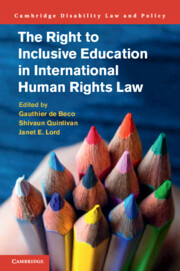Book contents
- The Right to Inclusive Education in International Human Rights Law
- Cambridge Disability Law and Policy Series
- The Right to Inclusive Education in International Human Rights Law
- Copyright page
- Contents
- Notes on Contributors
- Acknowledgements
- Preface by Theresia Degener
- The Arthur Cox Foundation
- 1 Introduction
- Part I Background
- Part II Theoretical Foundations
- A Conceptual Issues
- B Substantive Issues
- 7 Reasonable Accommodation
- 8 Progressive Realisation and the Right to Inclusive Education
- 9 Financing Inclusive Education
- Part III Implementation
- Part IV Practice
- Index
8 - Progressive Realisation and the Right to Inclusive Education
from B - Substantive Issues
Published online by Cambridge University Press: 15 April 2019
- The Right to Inclusive Education in International Human Rights Law
- Cambridge Disability Law and Policy Series
- The Right to Inclusive Education in International Human Rights Law
- Copyright page
- Contents
- Notes on Contributors
- Acknowledgements
- Preface by Theresia Degener
- The Arthur Cox Foundation
- 1 Introduction
- Part I Background
- Part II Theoretical Foundations
- A Conceptual Issues
- B Substantive Issues
- 7 Reasonable Accommodation
- 8 Progressive Realisation and the Right to Inclusive Education
- 9 Financing Inclusive Education
- Part III Implementation
- Part IV Practice
- Index
Summary
- Type
- Chapter
- Information
- Publisher: Cambridge University PressPrint publication year: 2019
- 1
- Cited by



